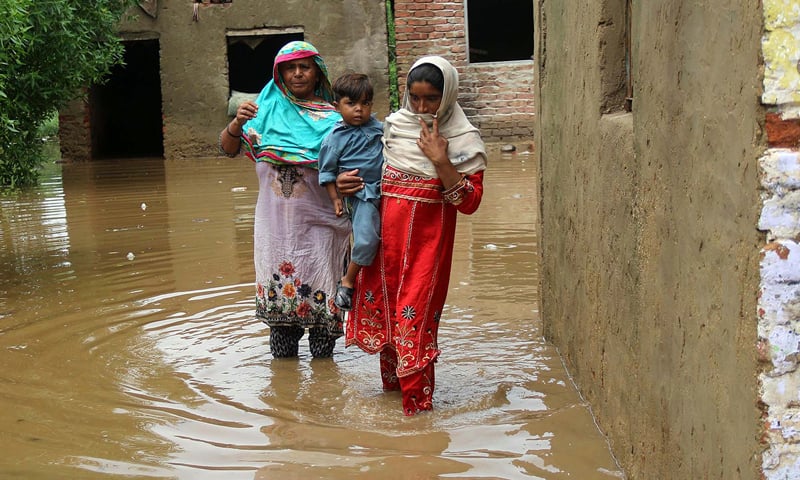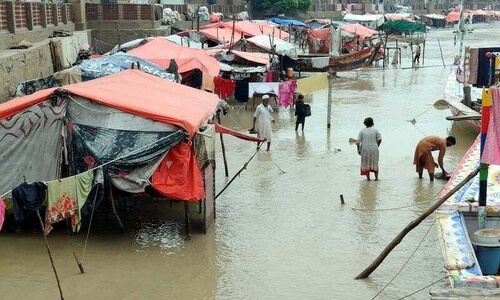• Death toll rises to 937, 30 million people forced to live without shelter
• 23 Sindh districts declared ‘calamity-hit’ as floods ‘submerge southern Pakistan’
• Govt requires over Rs72 billion for relief efforts; calls upon donors, nation to contribute
ISLAMABAD: Calling the incessant monsoon rains a “climate-inducted humanitarian crisis of epic proportions”, the Pakistan government on Thursday officially declared a ‘national emergency’ in light of the rain-induced floods which have so far killed 937 people, including 343 children, and left at least 30 million without shelter.
As per the latest data compiled by the National Disaster Management Authority (NDMA), Sindh reported the highest number of deaths as 306 people lost their lives due to floods and rain-related incidents from June 14 to date.
Balochistan reported 234 deaths whereas Khyber Pakhtunkhwa and Punjab recorded 185 and 165 deaths, respectively. In Azad Jammu and Kashmir, 37 people were killed while nine deaths were reported in the Gilgit-Baltistan region during the current monsoon rains. In the same period Islamabad reported one death.
Read: Balochistan, Sindh see ‘more rain than ever’ recorded
According to the NDMA, Pakistan received 166.8mm of rain in August, as opposed to the average of 48mm — an increase of 241 per cent. Sindh and Balochistan — the worst-hit regions — witnessed a 784pc and 496pc increase in the monsoon deluge, respectively, it added.
Consequently, the abnormal increase in rainfall generated flash floods across the country, particularly in the southern part of Pakistan, which remains inundated at the moment with 23 districts of Sindh being declared “calamity-hit”.
Monstrous monsoon
Minister for Climate Change Sherry Rehman said a “war room” has been established by the prime minister at NDMA, which would spearhead relief operations across the country. She admitted that the incessant “monstrous” rainfall had “made it hard to carry out relief operations, especially helicopter sorties”.
“Pakistan is going through its 8th cycle of monsoon; normally the country has only three to four cycles of [monsoon] rain,” the minister said during a press conference in Islamabad.
“Pakistan is under an unprecedented monsoon spell and data suggests the possibility of re-emergence of another cycle in September.”
Senator Rehman, who compared the current situation with the devastating 2010 floods earlier this week, said the current situation was worse than that. “The water is not only flowing from the north as in 2010, but it is equally or more devastating in its sweep and destructive power,” she added.

According to the senator, flash floods caused by heavy rains had swept away bridges and communication infrastructure in various areas of the country. “Almost 30 million people are without shelter, thousands of them displaced and have no food,” she told reporters.
Read: How our development model has exacerbated the impact of climate-induced flooding
Stressing the need for relief from international donors, the minister said that the need for shelter and relief was dire as per what the provinces had conveyed. “It is still an evolving situation and every day the needs assessments were changing as the rains did not stop and the water kept coming,” she said, adding that the number of homeless was growing.
Sindh has asked for one million tents and Balochistan has demanded 100,000 tents, she said, adding that all tent manufacturers had been mobilised and external donors were also approached for tents.
Initial needs assessment report
As per the government’s preliminary rapid needs assessment report, at least Rs72.36 billion is required to provide immediate relief to the flood-hit people. In terms of food and instant cash relief, the government requires Rs7.33 billion, for non-food items (NFIs) it needs Rs8.713bn, whereas Rs1.627bn are required for health-related expenses.
The government also requires Rs9.024bn to compensate the loss of cattle as a result of rain-induced floods while the machinery and related equipment required for the relief efforts would cost Rs4.646bn, as per the initial assessment. Meanwhile, in order to rebuild at least 82,000 houses damaged in the deluge would cost Rs41 billion i.e. Rs50,000 per house.
‘Appeal to Pakistanis’
Meanwhile, Information Minister Marriyum Aurangzeb evoked the “national spirit” and urged the nation, including overseas Pakistan, to come forward and help their compatriots at this critical juncture.
Editorial: For now, our leaders must focus on helping flood victims. Political circus can wait for another day
“The entire nation, especially the overseas Pakistanis, should donate generously to help the flood victims as a huge amount of money would be required for their rehabilitation in the wake of large-scale disaster, she said in a statement.
Ms Aurangzeb added that the federal government, along with the provinces, was making tireless efforts and all the resources were being mobilised. The minister said that owing to heavy rains and severe flooding, there were difficulties in relief operations and that public contributions were needed to ramp up rescue efforts.
She added that the details and process for depositing donations in the Prime Minister Flood Relief Account 2022 had already been made public.
Published in Dawn, August 26th, 2022













































